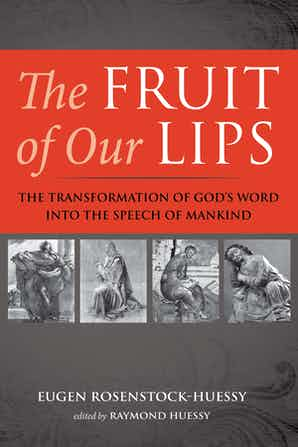The Fruit of Our Lips
The Transformation of God's Word into the Speech of Mankind

Paperback, 370 pages.
In the three essays included in this new edition of The Fruit of Our Lips, Eugen Rosenstock-Huessy made the clearest and most concise presentation of his understanding of the Christian tradition and of the creative power of the spoken word proclaimed at the beginning of Genesis, and hence at the heart of the Jewish and the Christian faiths. Two of the three essays have never appeared in English before. All three root in and contribute to the author’s ongoing dialogue with his friend Franz Rosenzweig and show the mutuality of the two men’s thinking, for all their differences.
Reading the material in the appendices in tandem with the three main essays, provides a unique overview of the interpenetration of Rosenstock-Huessy’s work on faith and his work on speech. In amending these essays (and in previously unpublished codas to the last of them) Rosenstock-Huessy still articulated and defended his faith in the terms he had used in his 1916 correspondence with Rosenzweig. Creation, revelation, and incarnation as on-going processes through the end of time; the rhythms of history; even Marcion’s role in forcing the church to formally proclaim Christ’s “Father” to be the LORD of Hebrew scriptures—all appear in the correspondence as they do in the title essay.
The first essay, “In the Cross of Reality,” proclaims that the cross is to be found in every aspect of social reality, and that the truths made explicit in the life of Christ are to be found in all of human history. (Wayne Cristaudo has said that this brief excerpt from the second volume of Rosenstock-Huessy’s Soziologie may be the key to his entire corpus.)
In the second, “Ichthys: Life, Teaching, and Action,” Rosenstock-Huessy formulates his “doctrine” of incarnation as an explicit response to the final section of Rosenzweig’s Star of Redemption. Rosenstock-Huessy shows how Christ’s life bore fruit in His teaching; but also how Christ lived backwards into life out of the vision granted in what Rosenzweig called “the sanctum that is in the innermost center”; and how that “life lived out of vision” was a life of action, a third phase quite separate from his teaching. Rosenstock-Huessy proclaims that sequence to be the inescapable conjugation of any fruitful spirit.
In 1945, Rosenstock-Huessy described the title essay as “the greatest chapter I have ever written.” It is neither an analysis of nor a commentary on the Gospels, but seeks instead to lay “the foundation for a history of the human spirit.” It argues that the fourfold character of the Gospels has profound meaning for the indivisible whole they form as Christ’s “lips.” Beginning with Matthew, each Evangelist takes as his audience one of the existing pre-Christian social orders (tribes, empires, the Greeks, and the Jews) and each Evangelist begins at the point to which his predecessor had come at the end. In the process of writing their Gospels, the four men themselves were changed–and it is that process which marks them as Evangelists.
As Freya von Moltke writes in her introduction to the title essay: “The gospels, says Rosenstock-Huessy, are the fruit of Jesus’ lips, the beginning of an entirely new way of speaking. Though they are four, they represent one organic whole. They complement each other; where one leaves off, the next one begins, and together they form a roadblock to the past. Together they started a process which has penetrated the ages—a process through which each writer himself is changed, as each addresses himself to one of the great streams of speech which antiquity had created. Used as we are to taking the New Testament as a religious book, it takes great effort for us to recognize the four gospels as the new process of speech, at once both human and universal.”
ISBN: 9781725291546
